| Srl | Item |
| 1 |
ID:
062592


|
|
|
| 2 |
ID:
068978
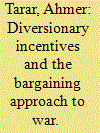

|
|
|
| 3 |
ID:
065797
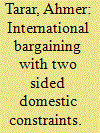

|
|
|
| 4 |
ID:
125134
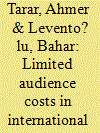

|
|
|
|
|
| Publication |
2013.
|
| Summary/Abstract |
Do audience costs have to be extremely large in order to credibly signal resolve and affect international crises? Existing theoretical work on audience costs suggests an affirmative answer, and recent empirical work on audience costs focuses on whether a leader can generate such large audience costs as to create a commitment to fight where no such commitment previously existed. We analyze a richer crisis bargaining model with audience costs and find that (1) audience costs can have war-reducing effects on incomplete-information crisis bargaining through a noninformative, bargaining-leverage mechanism and (2) audience costs can have war-reducing effects even when such large audience costs are not being generated as to create a commitment to fight where no such commitment previously existed. Even more limited audience costs can have war-reducing effects in international crises. We discuss how the bargaining-leverage mechanism is consistent with a number of prominent historical cases
|
|
|
|
|
|
|
|
|
|
|
|
|
|
|
|
| 5 |
ID:
091033
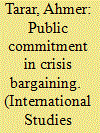

|
|
|
|
|
| Publication |
2009.
|
| Summary/Abstract |
The "audience cost" literature argues that highly-resolved leaders can use public threats to credibly signal their resolve in incomplete-information crisis bargaining, thereby overcoming informational asymmetries that lead to war. If democracies are better able to generate audience costs, then audience costs help explain the democratic peace. We use a game-theoretic model to show how public commitments can be used coercively as a source of bargaining leverage, even in a complete-information setting in which they have no signaling role. When both sides use public commitments for bargaining leverage, war becomes an equilibrium outcome. The results provide a rationale for secret negotiations as well as hypotheses about when leaders will claim that the disputed good is indivisible, recognized as a rationalist explanation for war. Claims of indivisibility may just be bargaining tactics to get the other side to make big concessions, and compromise is still possible in equilibrium.
|
|
|
|
|
|
|
|
|
|
|
|
|
|
|
|
| 6 |
ID:
151282
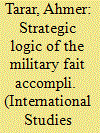

|
|
|
|
|
| Summary/Abstract |
When trying to change the status quo in their favor, leaders sometimes launch sudden faits accomplis involving the costly, but limited, use of military force. In doing so, they hope that the potential defender accepts the consequences and does not pursue further military conflict. But comparatively little scholarship tries to explain the use of this strategy. I examine the logic for engaging in a fait accompli from within the rationalist bargaining approach to understanding costly military conflict. My analysis identifies informational and commitment problems that can cause a leader to undertake a fait accompli, as well as an informational problem under which the fait accompli can trigger an unwanted war with the potential defender. My model also applies to dilemmas of extended deterrence; it provides some new insights into this area as well. Overall, it helps explain wars that are not preceded by crisis bargaining.
|
|
|
|
|
|
|
|
|
|
|
|
|
|
|
|